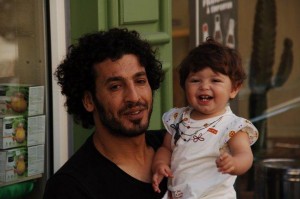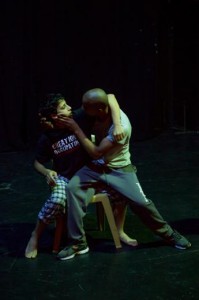The Sleep of Reason
Despite Adversity, the Shows Goes on at The Freedom Theatre
by Christine Baniewicz
Nabil Al-Raee, the currently incarcerated artistic director of The Freedom Theatre, awoke five nights ago to the sound of barking dogs. It was shortly after 3 A.M. on Wednesday, June 6th.
 “I woke to check why the dogs were making such noise,†writes his wife, Micaela Miranda. “I came out of our house and saw more than 6 soldiers on our front gate and surrounding wall, all pointing guns at me with their lights on.â€
“I woke to check why the dogs were making such noise,†writes his wife, Micaela Miranda. “I came out of our house and saw more than 6 soldiers on our front gate and surrounding wall, all pointing guns at me with their lights on.â€
Post-midnight raids are common under the Occupation. In December 2011, The Freedom Theatre reported more than 30 post-midnight arrests in Jenin Refugee Camp. Among those arrested were several staff members of the theatre itself. I remember their wincing steps and bloodshot eyes the morning after their abductions. Many had been blindfolded. Some had been beaten with the butts of guns.
So when Micaela woke to the army outside her door, she knew the precedent.
“One of our dogs was jumping on them like mad and I was afraid they would shoot her, so I continued walking in their direction and took her inside to close her in the stairway. As soon as I took the dog out of the way they jumped in the limits of our house and directed themselves to the door that was open. I ran before them and closed the door in their face. ‘There are women getting
dressed here’ — at this moment my sister in law had woken up and was covering her head. They waited a little while and then knocked the door strongly.”
The soldiers asked for Nabil.
Raised in Aroub refugee camp near Bethlehem, Nabil Al-Raee has worked with The Freedom Theatre since it opened its doors in 2006. After the tragic assassination of Juliano Mer-Khamis, the founder and former artistic director of the Theatre, Nabil now shoulders great responsibility in carrying forward the theater’s mission to enable the young generation in the area to develop skills for building a better future for themselves and their society. He works daily alongside his wife and fellow staff members, planning programs and teaching acting classes.
Nabil rose from bed to meet the soldiers at the door. A month prior, he had traveled with Micaela to Salem at the military’s request for interrogation. They cooperated peacefully throughout the 6-hour process, answering questions about the late Juliano Mer-Khamis. “Who killed Juliano?†They were asked again and again.
“A very difficult question to answer, as you can imagine.†Micaela and Nabil, like the other staff at the theatre, were close friends and professional partners of Juliano. Despite the Israeli army’s repeated interrogation and harassment of the theatre staff, no killer has been charged.
Bizarre as it was, at least the army had issued prior notice of this recent questioning. Tonight was different. The couple had not expected company.
“They called Nabil, sat him in the sofa outside and asked me to bring his shoes, his coat, his phone and some money.†When Micaela asked why, they responded, “for him to be able to come back.â€
“At this point it was clear they were going to take him.†Micaela began questioning the soldiers, “Why are you taking him? Where are you taking him?â€
They answered, “You will know later, go inside.â€
Micaela insisted. “You invade my house, you are taking my husband, it’s my right to know!â€
Nabil remained calm. “Don’t worry,†he said. “I’ll be back soon.â€
Nabil’s calm reflects more on his constitution than the state of justice in Israel.
According to the prisoner support organization Addameer, a Palestinian detainee can be held for up to 90 days without access to a lawyer, and half a year without a charge.
Nabil kissed his infant daughter goodbye before leaving with the soldiers.
“I’ll go on my feet, you don’t need to push me.†He walked with them into the dark.
Three soldiers remained behind, urging Micaela and her sister in-law back into
the house. “If you don’t go back in, I will make you go by force,†one of them said in Arabic. When he attempted to threaten her physically she stood between him and her sister in-law.
“You got what you came for,†she said from the door.
He retreated to his fellow soldiers near the gate, where they stood in the dark, guns pointed at Micaela on the porch.
“What do you feel when you do this kind of thing?†Micaela called from the
porch. “Are you happy? He is an artist!â€
The soldiers mocked her from the gate. “You are wasting your words,†one called. “You are wasting your lives.†The soldiers finally left.
More than five days have passed since Nabil’s arrest. According to his lawyer,
Smadar Ben-Natan, Nabil is presently held at the Jalameh detention centre north of Jenin, inside Israel. This is the only information released to him thus far. As evidenced by last December’s raids, interrogations at Jalameh commonly involve inhumane treatment: sleep deprivation, psychological pressure, and binding in painful positions.
“Nabil was calm and cooperative,†writes Micaela. “As all Palestinians, he knows that he had no choice and I felt he was trying to avoid any conflict. We all believed in that moment that he would be back soon.â€
Five days later, Nabil is still held without charge in an Israeli detention centre.
This is the army’s fourth attack on The Freedom Theatre, its employees and their families. The Theatre has expressed its full cooperation in the investigation of the murder of Juliano Mer Khamis, and has met every requested appointment.
This last abduction of Nabil Al-Raee, however, has shaken the theatre. According to the press release on their website, the regular and systematized harassment of the employees of The Freedom Theatre has nothing to do with the investigation of the murder of Juliano but is clearly a campaign directed at the Freedom Theatre itself.
In the same press release, the Theatre urges all supporters and protectors of art and culture to call and e-mail the nearest Israeli representative office to demand the immediate release of Nabil Al-Raee and an end to the systematic harassment of the members of The Freedom Theatre. American citizens can reach out to Michael Oren (info@washington.mfa.gov.il), Israeli Ambassador to the U.S. and Sarit Arbell (culture1@washington.mfa.gov.il), the director of cultural affairs at the Israeli embassy.
 But what does a theatre do without its artistic director?
But what does a theatre do without its artistic director?
“Rehearse,†says Micaela. “We are still planning to perform in early July.†Nabil had been directing students to perform an adaptation of Harold Pinter’s The Caretaker at the time of his arrest.
“He taught us never to give up,†writes Motaz Malhees, one of Nabil’s acting students. They continue to rehearse with Micaela as they wait for any information from Israeli authorities.
“People ask me what they can do,†writes Micaela. “I say, ‘call, call, and call. Write and call.’†Write letters, emails, and blog posts, she urges. Nabil’s students say the same.
“Write a poem,†Motaz told me the last time we spoke. “Something like, ‘I want to wake up from my dream, to see freedom and peace.’ You can do it?â€
I close my eyes and hear barking dogs, squint in the glare of light and rifles trained on me. I imagine walking into the dark with my shoes and some money so that I can come back.
According to a report by Amnesty International earlier this month, Israeli authorities were holding at least 308 administrative detainees as of April, and I imagine the anxiety and fear of their families as they wait for news of their loved ones.
I open my eyes. “Yes,†I tell Motaz. “I think I can write that.â€
{Update: According to Micaela, at the time of this publishing, Nabil was finally allowed to meet with his lawyer for 30 minutes. The first thing he asked was for the lawyer to send his love and say that he is okay. He complained about the bad conditions of the prison; he is sharing a small room with 6 other people. He now waits for his next court hearing scheduled on Monday, June 25th.}
Christine Baniewicz is a writer, composer and facilitator of community-
engaged theatre. She has a Bachelor’s degree in Theatre Studies from Louisiana State University, and she leads applied theatre workshops around the world as an associate artist with the traveling theatre-arts organization, ImaginAction. Christine lives in Oakland, CA. {Photo credits, with permission: S.E.T.}

Thank you, Christine, for sharing this account of what Nabil Al-Raee is going through. It’s so much more personal than the activist emails I’ve received. It should inspire many more people to express their concern and their outrage.
1